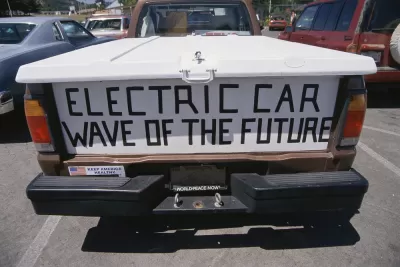It’s time to harness technology for cleaner, healthier, and safer cities.

This article calls for the elimination of vehicular exhaust from urban centers within the next ten years. It draws an analogy between tolerating polluted air in our city streets and smoking on an airplane, which was finally banned in the year 2000.
The writers state: "With the ever-improving performance of electric-powered vehicles - from autonomous shuttles to new forms of micromobility - and a growing realization that quality of life is not all about moving traffic, there is no reason that we can’t have city centers that are cleaner, healthier and safer than what we have today."
The article discusses other sources of pollution, including particulate matter, and explains that electrically powered vehicles still have better environmental performance even when their power source is derived from fossil fuels. Finally, the article challenges North American cities to catch up with European cities in taking on bold proposals to limit fossil fuel engines and create environments that better accommodate pedestrians, bikes and other clean modes of transportation.
FULL STORY: Exhaust-free city centers by 2030!

Montreal Mall to Become 6,000 Housing Units
Place Versailles will be transformed into a mixed-use complex over the next 25 years.

Planetizen Federal Action Tracker
A weekly monitor of how Trump’s orders and actions are impacting planners and planning in America.

DARTSpace Platform Streamlines Dallas TOD Application Process
The Dallas transit agency hopes a shorter permitting timeline will boost transit-oriented development around rail stations.

Without International Immigrants, the Rural US Population Would Be Falling 58%
Census data shows that population growth in rural areas is due in large part to international migrants.

Dead End: Nine Highways Ready for Retirement
The Freeways Without Futures report describes the nation’s most promising highway removal proposals.

Congressman Proposes Bill to Rename DC Metro “Trump Train”
The Make Autorail Great Again Act would withhold federal funding to the system until the Washington Metropolitan Area Transit Authority (WMATA), rebrands as the Washington Metropolitan Authority for Greater Access (WMAGA).
Urban Design for Planners 1: Software Tools
This six-course series explores essential urban design concepts using open source software and equips planners with the tools they need to participate fully in the urban design process.
Planning for Universal Design
Learn the tools for implementing Universal Design in planning regulations.
City of Mt Shasta
City of Camden Redevelopment Agency
City of Astoria
Transportation Research & Education Center (TREC) at Portland State University
City of Camden Redevelopment Agency
Municipality of Princeton (NJ)
Regional Transportation Commission of Southern Nevada





























